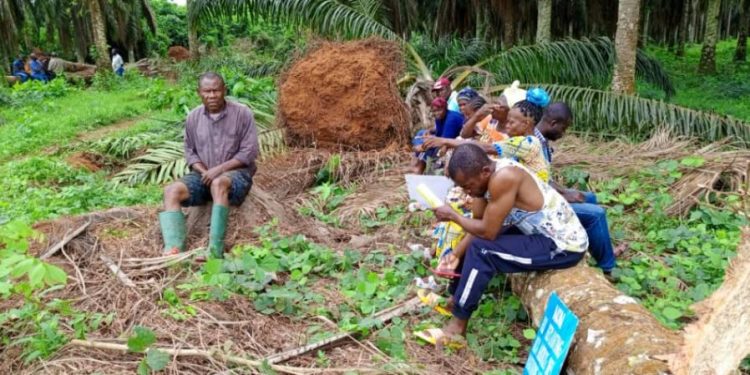Story, Louvier Kindo Tombe
Madam Mundeng was wearing a sad face that Saturday afternoon when by 2:00 PM, the bike rider who was to transport her seedlings to the farm had still not showed up. “I don’t know what is keeping him”, she exclaims as she carefully parked the heaps of seedlings to one corner of the compound. “it is over for today, my fellow women are already on their way back from their farms”.
Women in Apouh à Ngock, à locality in Edea I sub division, Sanaga Maritime division of the Littoral region, cover a distance of over 30 kms to their farms and back.
“We don’t have farmlands around,” says Madam Félicité NGON BISSOU, president of the association of women living around the SOCAPALM plantation in Edea (AFRISE).
“SOCAPALM has confiscated our farm lands and forest without compensation for over 40 years,” the president added.
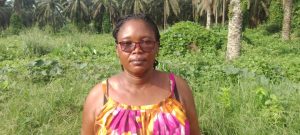
“We are now landless peasant women, and we have a responsibility to provide food for our families.”
The village of Apouh à Ngock is completely surrounded by SOCAPALM plantations and the activities of the company have caused untold hardship to the different communities around. The absence of farm land has greatly reduced agricultural activities that used to be booming in the village.
“We live in the village as if we are in town. We buy basic needs we could have been harvesting around,” says Marie Thérèse Ngon Ndoume, Secretary General of AFRISE.
Deprived of their main sources of livelihood, SOCAPALM has also erected multiple barriers and dug up 4x4m trenches around some of their huts. They cannot carry out economic activities in such conditions. Even the village plantations is systematically been destroyed by the company including their palm oil production units, even though they have the right to process the nuts from their village plantations.
The people are forced to compromise in order to survive with their families. Hardship has transformed most of the youths into radicals.

“We suffer physical violence, sexual violence, sexual abuse, rape and arbitrary arrest on a daily basis,” Madam Mundeng, a native of Apouh recounted to this reporter in tears.
The activities of the agro-industry do not only affect their land but equally their rivers, ancestral shrines and pollutes the air they breathe.
“SOCAPALM has extended its plantation right insides our cimetaries,” says Bernard Youmba, notable of Apouh à Ngock.
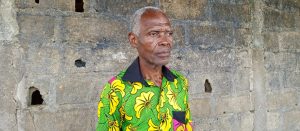
“Even the first palace in the village is destroyed and palm trees now stand besides the grave of the first chief of Apouh,” Bernard Youmba told News Upfront.
The people of Apouh travel miles by motorbike or on foot to find drinking water. When they fall ill, they are not even entitled to treatment in SOCAPALM health services on the spurious grounds that they are not company employees. Their children are not allowed to attend the schools built by the company, and they cannot find decent jobs in the company once they reach working age.
SOCAPALM is supposed to be a development project, but the community is questioning who are the beneficiaries of the project. The people around the plantation have faced the challenges from SOCAPALM for years and when the plantation around the village residential areas was no longer productive, the communities saw it as an opportunity to reclaim part of their land seized by SOCAPALM.
To their greatest surprise, the company embarked on replanting the plantation. The replanting is seen by the population as the beginning of a new cycle of hardship.
Quest for justice
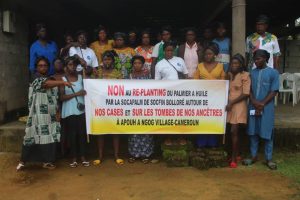
The replanting of SOCAPALM plantation in Edea is at the centre of discord between the women of AFRISE, local administrative authorities and the management of the oil company.
The discord has existed since the idea was raised some years back. Recently, it died down thanks to continuous negotiations but the hopes of the communities were dashed out when on March 19, 2024, the company notified them through their village chief that the process will resume in April.
Reacting to the notice, the women of AFRISE who are championing a struggle to stop the replanting programme addressed an open letter to the management of SOCAPALM, in which they called on the company to postpone the programme.
The company replied them, indicating that the area around the village which is to be replanted belong to them and they have a land title for it.
The situation reached administrative authorities and the Divisional Officer for Edea I, wrote to the association, threatening the president should they initiate any move to tarnish the image of SOCAPALM.
“Don’t be surprised that I might be arrested anytime soon,” Félicité NGON BISSOU told News Upfront.
“Security officers are closely monitoring my movements.”
She might however not be the first to be arrested given that even the village chief recently spent hours in a police detention facility as a result of the communities resistence to the replanting programme.
The idea behind the open letter was to mitigate the consequences of the activities of SOCAPALM, and for peace to reign.
“We are not chasing SOCAPALM away, we can’t even, we are just demanding for a reasonable peace of land to farm,” Marie Thérèse Ngon Ndoume said.
“We want SOCAPALM to understand that our children too have a future to live,” Félicité NGON BISSOU added.
Respect for laws
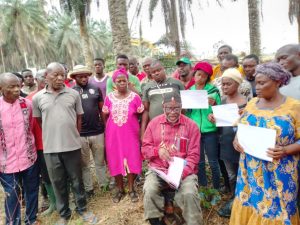
The women of AFRISE in their open letter also reminded authorities of SOCAPALM that the replanting programme is in violation of the terms of a long term lease agreement signed with the state of Cameroon. The agreement in its article 6(h) focuses on “the obligation of the transferee”.
The women in the letter quoted the article to say that it “prohibits any replanting of land within an area of 250 ha around village communities without the competent administration having first set aside plots of land allocated as living space”.
To SOCAPALM, the Edea plantation is not concerned with the agreement because by the time it was signed, SOCAPALM had not yet bought the plantation from the Swiss firm that formerly owned it.
Way forward
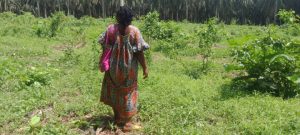
According to the women of AFRISE, they are not ready to abandon the struggle with SOCAPALM anytime soon.
“We will stop at nothing in this quest for justice,” Félicité NGON BISSOU told this reporter.
